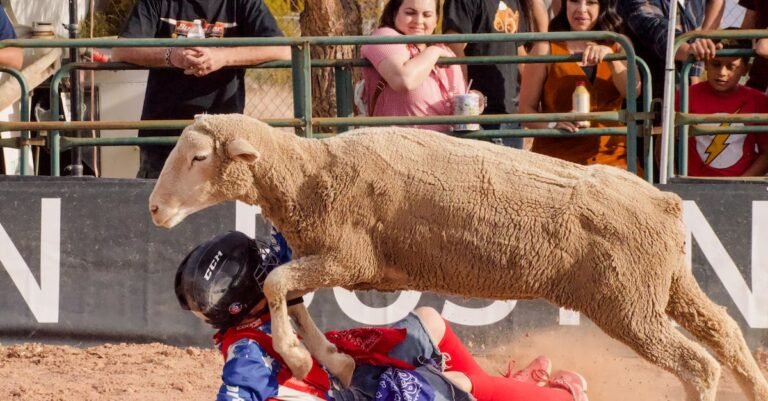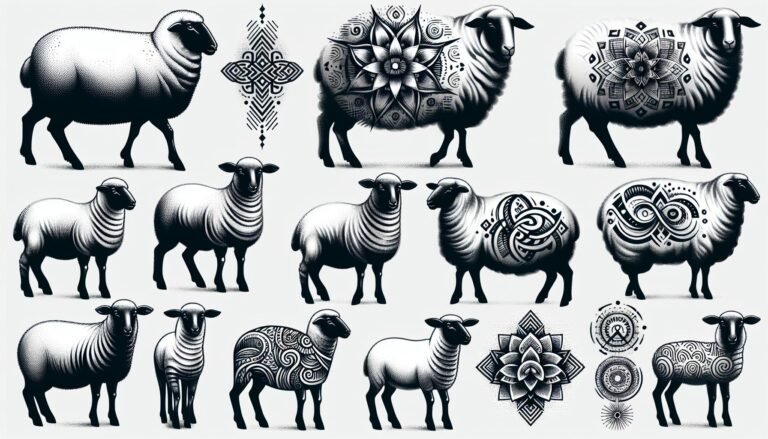Unraveling the Speed of Sheep: A Comprehensive Look at How Fast Sheep Can Run
Ever wondered how fast a sheep can run? It’s a question that’s not as odd as it may first seem. After all, these fluffy creatures aren’t just good for wool, they’ve got some speed under those hooves too!
Key Takeaways
- Sheep can run surprisingly fast, with an average sprint speed of 25-30 km/h. This speed varies depending on the breed and physical fitness of the sheep.
- Several factors influence a sheep’s running speed, including the breed, age, health and fitness, and the environment and terrain.
- Different sheep breeds have varying speeds and endurance levels. For instance, the Rambouillet breed is known for its fast sprinting ability and endurance.
- Sheep’s speed evolves as an effective defense mechanism against potential threats and predators, such as wolves and large cats.
- Comparatively, a healthy Rambouillet sheep can run faster than slow dog breeds like Basset Hounds and Bulldogs, but much slower than a domestic cat or a cheetah.
- Sheep’s speed and endurance make them uniquely adaptable to various environments and conditions, playing a significant role in their survival in various terrains.
Running speed of sheep
Onto the fun facts. Sheep can actually run pretty fast! Quite a surprising fact considering they’re mostly known for producing wool. But wool isn’t the only amazing thing about them. Let’s delve into this a little more.
Sheep can run at an average speed of about 25-30 kilometers per hour (km/h) in short bursts. This speed depends heavily on their breed and physical condition. That’s considerably faster than you might’ve imagined, right? For comparison, an average human sprint speed is usually around 24 km/h.
Let’s have a quick look at these comparisons in a table:
| Species | Average sprint speed (km/h) |
|---|---|
| Human | 24 |
| Sheep | 25-30 |
You’re probably wondering why they can run so fast. A common reason is predator evasion. In the wild, they’re prey to wolves and large cats. Over time, their speed has evolved as an effective defense mechanism allowing them to escape potential threats.
You’ve also heard about the ‘sheep race’. Haven’t you? It’s quite popular in some countryside areas where they race sheep. It’s an interesting, fun-filled event to watch! Don’t forget, the sheep reach these top speeds mainly when chased or under some form of threat, so it’s not something they do on an everyday basis.
On a side note, it’s worth mentioning that not all breeds of sheep have the same running speed, just like not all humans can run at the same speed. For instance, some breeds are known for their stamina such as the Rambouillet, while others like the Merino are prized for their fast sprinting abilities.
So, it’s clear that sheep aren’t just cuddly creatures that supply us with wool. They’ve got speed on their side too. Let’s keep in mind though that the sprinting ability of each sheep largely depends on its breed and physical conditions.
Factors that affect a sheep’s running speed
Certain factors determine how fast a sheep can run. Understanding these can provide deep insights into this fascinating aspect of sheep behavior.
Firstly, breed is a significant factor. Different breeds have different physical characteristics which in turn influence their running speed. For instance, the Merino, renowned for their fine wool, are known for their endurance rather than speed. On the other hand, the Rambouillet, a breed derived from the Merino, display a greater flair for speed.
Secondly, the sheep’s age plays a role in determining its running speed. Like most animals, lambs show higher sprint speed due to their youth and energy. With age, the speed of sheep decreases mainly due to wear and tear on their bodies.
The health and fitness of the sheep is another major factor. A healthy, well-fed sheep with adequate exercise is likely to reach higher speeds than a malnourished or ill one. Ensuring proper diet and care is imperative for a lamb to reach its maximum speed potential.
Lastly, the environment and terrain also influence how fast a sheep can run. Sheep can motor along quite speedily on flat ground. However, if the terrain is rocky or steep, the speed can lessen due to the need for careful navigation.
Adapting to various conditions is what makes sheep unique. Their capacity to endure and skirmish at impressive speeds demonstrates their agility and resilience, ensuring their survival in harsh environments.
The fastest sheep breed
When it comes to speed, not all sheep are created equal. Some breeds outpace their counterparts, displaying fierce agility and impressive speed. If we’re searching for The fastest sheep breed, our focus should primarily be on the ‘Rambouillet’ breed.
Originating from France, the Rambouillet breed has made a name for itself when it comes to speed. With adult males capable of reaching speeds up to 15 miles per hour, these woolly sprinters leave many of their domestic sheep breeds in their dust. Their high speed owes to their impressive physical characteristics, in particular their long legs and lean body which aids in running.
But what makes the Rambouillet breed stand out isn’t just its speed. It’s also their endurance. Unlike many other fast-moving animals, the Rambouillet can maintain their speedy gate for a considerable duration without tiring quickly. Their strong pacing allows them to traverse long distances over a short period, a trait that’s invaluable in avoiding predators and surviving in various terrain.
While there are no official records that measure the speed of every sheep breed globally, anecdotal evidence and shepherd experience drills down to the fact that Rambouillet sheep are among the fastest. Here’s a little data on the standards of speed in sheep breeds:
| Sheep Breed | Average Speed (mph) |
|---|---|
| Rambouillet | 15 |
| Merino | 10 |
| Texel | 8 |
However, one might notice some Rambouillet sheep running slower than others. This discrepancy can be chalked up to factors such as health, age, and the terrain they’re moving on. Despite these factors, their breed’s inherent swiftness makes them one of the fastest sheep breed in the world.
Sheep vs other animals: How does their speed compare?
When considering the speed of various animal species, it’s fascinating to compare sheep with other creatures. I find it intriguing that despite the slow and docile reputation, sheep can hold their own in a race with many animals.
Starting off with our domestic pets, an average sheep, like the Rambouillet breed, often outruns a dog. Dogs, notably the Basset Hound and Bulldog, known for their slow speeds, can run at about 5-10 mph. Now, that’s nowhere near the 15 mph that our swift Rambouillet sheep achieves!
But what about against our feline companions? Sadly, I must admit the domestic cat, clocking in at roughly 30 mph, leaves the sheep trailing in the dust. In the wild kingdom, comparing sheep speed with that of a cheetah (which tops out at 60-70 mph) feels a bit unfair. But it gives us a good perspective on the vast range of animal speed capabilities out there.
On the other hand, in a match between sheep and tortoises, sheep undoubtedly take the win. A tortoise’s speed only averages about 0.17 mph. Even the slowest sheep can briskly trot away from a tortoise without breaking a sweat!
Let’s have a quick look at some of these figures in a comprehensive table:
| Animal | Average Speed (mph) |
|---|---|
| Sheep (Rambouillet Breed) | 15 |
| Slow Dogs (e.g., Basset Hound, Bulldog) | 5-10 |
| Domestic Cat | 30 |
| Cheetah | 60-70 |
| Tortoise | 0.17 |
Conclusion
So, we’ve learned that a sheep’s speed isn’t just about the breed but also factors like age, health, and environment. It’s fascinating to see how these fluffy creatures can outrun dogs, proving that they’re not as slow as we might think. But let’s not forget, they’re no match for the swift cats and cheetahs. Yet, when it comes to the tortoise, sheep have the upper hand. This exploration of sheep speed has given us a fresh perspective on these often-underestimated animals. Next time you see a sheep, remember, they’ve got more speed than meets the eye.







